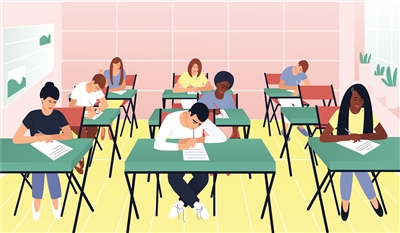Another Grading debacle for GCSE`s and A-Levels

Many teachers are raising concerns over how GCSE and A-Level grades will be awarded this year. With repeated lockdowns and school closures, and so much missed class-time the Department for Education has decided pupils` teachers will calculate their grades. With pressure growing every week to implement this novel system, a number of head teachers have expressed they are being compelled to make students sit an `excessive` number of examinations, along with feeling pressured to `unjustly` lower grades of high achievers through analysis of their past work.
The point to bear in mind here is that this kind of grading system has never been implemented: teachers have never had the responsibility of grading their pupils. They may have marked coursework and some modules, with these results directly affecting their results, but they have never had such a burden of being directly responsible for a pupil`s final grade.
Many schools are reportedly in a state of panic over this mandate issued by Ofqual, who have also asked them to consider in mind their school`s previous results, using its past record `as a guide to help them to check that their judgments are not unduly harsh or lenient.` Many would say this is a discriminatory methodology, as high achieving pupils in an underachieving school may have their grades forced down.
Many will remember only too well the debacle of last year, where Ofqual utilised a disputed algorithm that overly factored the historical exam results of each school, in order to generate a grade for each pupil. This led to many thousands of pupils attending poorly performing state schools having their grades reduced - the official statistic being that 39.1% of 700,000 teacher assessments were downgraded by at least one grade. Does a computer algorithm, however sophisticated, know better than a pupil`s teacher what grade they should be awarded?
It seems matters have improved somewhat since last year though, as pupils will be required to sit a large number of exams, the results of which will heavily factor into their final grade. Many teachers though are complaining that the sheer number of exams - as many as 35 over the next six weeks according to one London comprehensive - are simply too stressful for their pupils.
Members of the National Education Union have said that guidance issued by Ofqual could lead to grade distortion across the country. Their joint General Secretary Mary Bousted put their concerns clearly when she said:
`It may suppress the grades of a year group which has more able students than in the previous years. It could lead to injustices… It`s imposing a data-driven outcome rather than an achievement-driven outcome.`
Teachers are being asked to award their students `evidence-based grades.` One would certainly hope that evidence is being used to determine results that may have a profound impact on students` lives - but the implication here seems to be that the work undertaken by pupils over the forthcoming term may be weighted more heavily than any previous work. The Joint Council for Qualifications (JCQ) announced in a recent publication that `More recent evidence is likely to be more representative of student performance, although there may be exceptions.`
Their publication, which outlines the procedures recommended to provide a fair grade for all pupils, is a substantial and complex document, and I can only imagine that teachers will be under enormous pressure to abide by its many strictures, and give their pupils a fair grade. In any year thousands of pupils of appeal their grades - I suspect the 2021 appeals process will be the busiest on record.
The word `unprecedented` has become ubiquitous over the last 12 months, but it is certainly true that, outside of wartime, there has never been such disruption to children`s education. Ensuring pupils are awarded the grades they deserve is going to be difficult. I suspect there is currently an inclination to assess pupils too intently, with the aim that this will lead to fairer grades - but there is a danger here that students become overworked and exhausted, fatigued by constant exams, and as such do not perform to their full abilities. One could argue that whatever system is in place to grade students, there will always be those whose true abilities are well represented, and those who simply do not perform their best.
Jules White, leader of the school finding campaign Worthless? Has express that teachers are already feeling the strain to collate all the academic evidence required, and has cautioned against over assessing pupils:
`There is a danger schools will carry out too many exams when the whole point is that they were cancelled because everyone agreed that they couldn`t be carried out fairly. A range of evidence should be used rather than solely re-running exams by the backdoor.`

 Add a Comment
Add a Comment